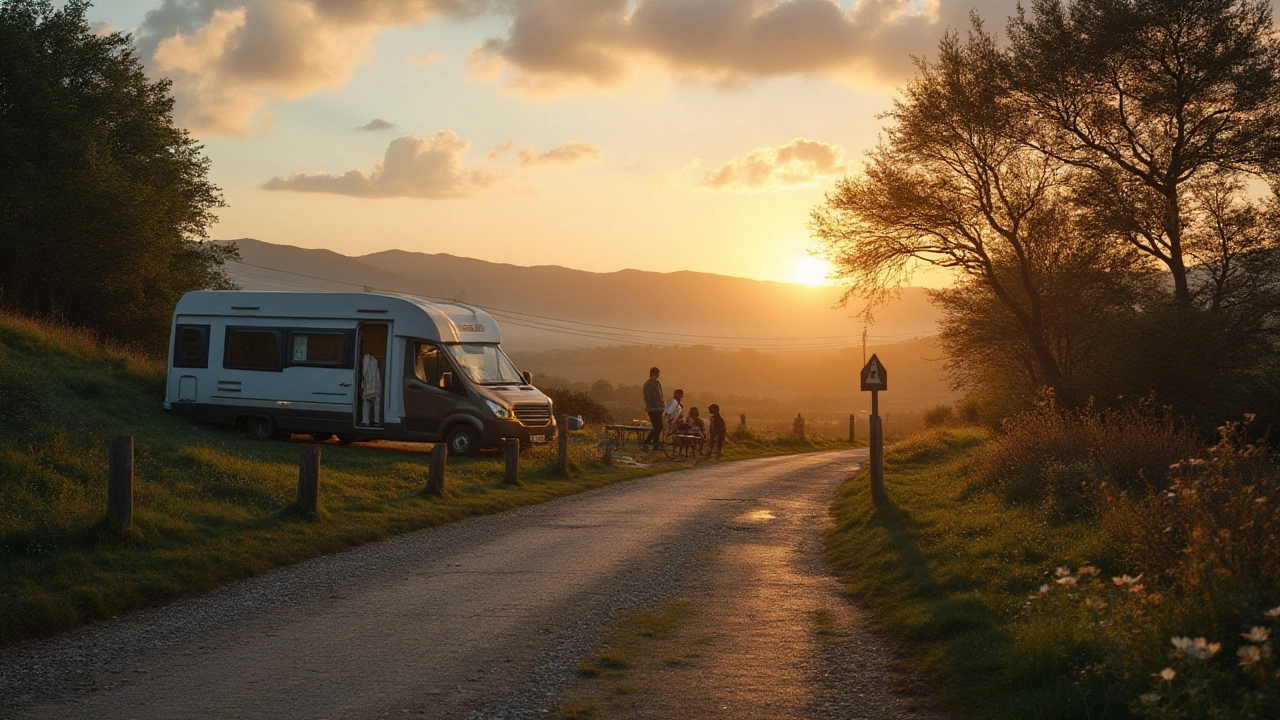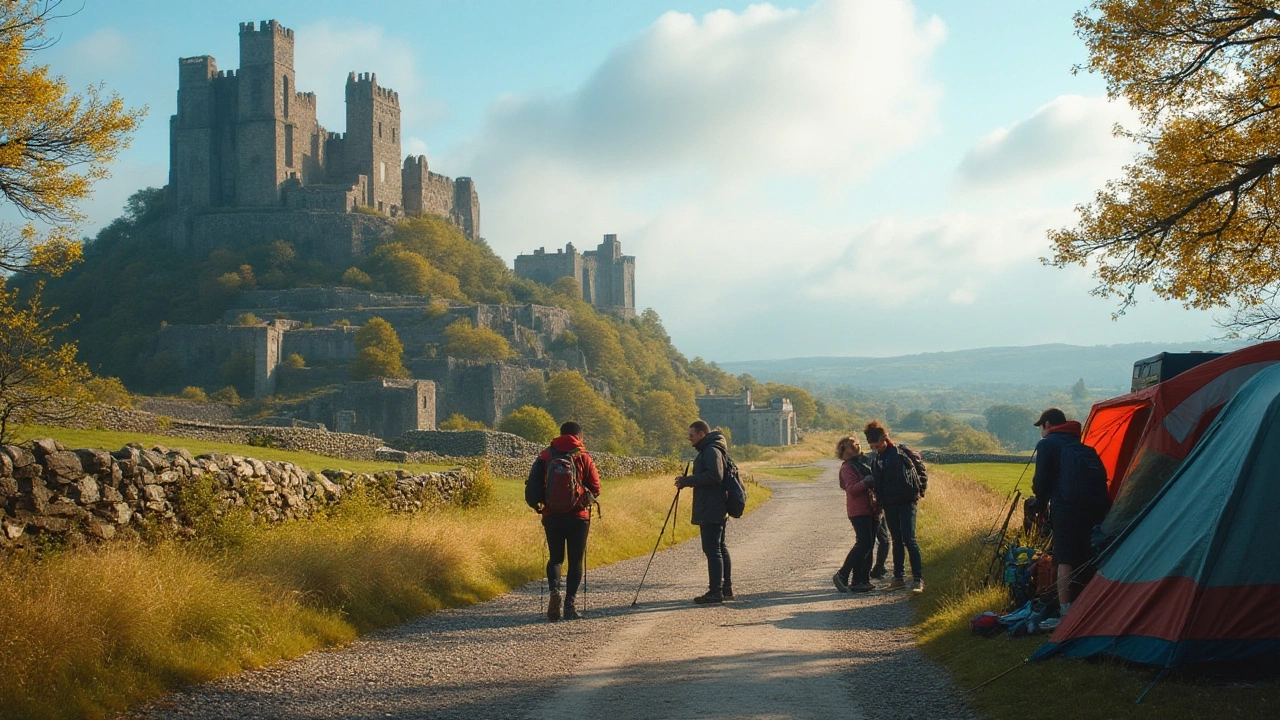Is Overnight Parking Allowed in UK Laybys?
 Jan, 17 2025
Jan, 17 2025
Many travelers exploring the charming roads of the UK wonder if they can catch a quick nap or settle in for the night in one of the country's numerous laybys. This question often arises for road trippers who seek a blend of adventure and budget-conscious traveling. Before you unfold your map and recline your seat, it's important to know the ins and outs of this subject.
While it may seem like a convenient option, there are certain regulations and safety considerations involved. Are you allowed to park your vehicle and spend the night without facing penalties? Understanding the local laws and prioritizing your safety can make all the difference. Besides, with the right safety measures and preparations, your layby stay can be both comfortable and worry-free.
- Regulations and Legal Considerations
- Safety Tips for Layby Camping
- Comfort and Preparedness
- Alternatives to Laybys
Regulations and Legal Considerations
So, you've embarked on a road trip across the UK and you're considering making a stop for the night in a layby. Before you tuck yourself in, it’s crucial to acquaint yourself with the rules that govern overnight parking in these roadside havens. Laybys, essentially small pockets off the road intended for short breaks, are subject to legal stipulations that vary across regions. In general, the UK does not have a blanket law that explicitly prohibits overnight stays in laybys; however, local councils have the jurisdiction to enforce specific regulations, and these can differ markedly from one location to another. For instance, some areas may have signage indicating that overnight stops are not permitted, while others may be more lenient.
It's not uncommon to find signs that spell out restrictions, and violating these could result in fines. This holds especially true in tourist-heavy regions where competition for roadside rest areas is fierce, and councils are tasked with maintaining public order and safety. Moreover, it's important to consider that laybys usually lack proper amenities like toilets or running water, making them less ideal for a extended stay. "Following the rules of the road isn’t just about respecting local laws; it’s about being a responsible traveler," notes Tom Merrick, a seasoned travel author, highlighting the importance of compliance.
Understanding the nuances of local laws is essential, as is consulting with official resources or travel guides before planning your stop. These measures won't just keep you within legal bounds but can also significantly enhance your travel experience by enriching your understanding of local customs and practices. While some motorists opt to stay in laybys without issue, this should never be taken as a given. Preferably, opt for designated camping areas where facilities and support are readily available. As a rule of thumb, staying informed and respectful of local statutes is crucial to ensure a hassle-free journey.

Safety Tips for Layby Camping
When you're planning to sleep in a UK layby, safety should top your list of priorities. They might seem like cozy roadside havens, but laybys can be unpredictable. The first step is selecting the right location. Choose a layby situated in a low-traffic area, preferably away from major highways, as these spots are often quieter and less prone to accidents. Some laybys can be magnets for unsavory activities, so opting for those in well-lit, visible areas can diminish risk. Trust your gut: if a location feels off, it's best to move on.
Vehicle Security
It's essential to consider vehicle security while enjoying your overnight parking UK experience. Always lock your doors and keep windows shut tight while you're inside. Installing a car alarm can give you added peace of mind. Moreover, be cautious not to advertise your valuables; hide electronics, cameras, or anything shiny which might tempt opportunists. You may even want to look into purchasing window curtains for sleep privacy and to deter peepers.
Personal Safety
Keep your safety kit handy. Pack essentials like a flashlight, first aid kit, and maybe even pepper spray if you feel it necessary. Knowledge of basic self-defense tactics can be an asset, although they're something you hope never to use. Let at least one person know where you plan to stop for the night. This way, someone else is aware of your location, and you can be checked on. There's also an app trend—apps that track user locations can be a digital safety net for solo campers.
Environmental Awareness
Being environmentally mindful is also a part of being safe. Laybys can be nature-rich spots, and it's imperative to keep an eye out for wildlife. Inquisitive creatures can put a damper on your rest (imagine waking up to a nosey badger at your window!). Dispose of any trash considerately in designated bins. It ensures your safety and that of local fauna. Finally, always be aware of weather conditions since the UK can surprise you with a quick switch from sunshine to shadowy rain!
"When using laybys, acknowledge both your comfort and safety," notes The Camping and Caravanning Club, highlighting the unique blend of prep and spontaneity needed for successful layby stops.

Comfort and Preparedness
When it comes to settling down in a layby for the night, comfort truly becomes king. The idea of turning your vehicle into a temporary retreat might seem daunting at first. However, with a bit of planning and foresight, it can become a surprisingly cozy experience. First and foremost, ensure your vehicle is parked on level ground; this helps in maintaining equilibrium and guarantee a restful sleep. Arranging your sleeping space efficiently is a must. Blankets and cushions can transform the backseat of your car into a snug oasis in the heart of nature.
Packing appropriately is another key aspect of ensuring comfort during your layby camping adventure. An easily accessible overnight bag packed with essential items is a game changer. Consider packing a small pillow, warm blankets, and perhaps an inflatable mattress if you have extra room in your vehicle. A reusable water bottle, flashlight, and some basic toiletries can greatly improve your layby encounter. Such conveniences provide a sense of contentment and make a night under the stars more enjoyable than ever. Sleep in layby often requires you to be ready for fluctuating weather conditions, so an emergency thermal blanket can come in handy too.
An additional consideration includes meal preparation for the time spent at a layby. Of course, snack bars and sandwiches are convenient, but a portable stove can elevate the whole experience. Imagine sipping on freshly brewed tea as twilight descends, or treating yourself to hot soup or pasta on a chilly evening. Taking extra food supplies ensures that hunger is not a concern, granting you the freedom to relish the serene surroundings.
While maintaining your comfort, keeping your vehicle safe and intact becomes just as crucial. Ensure the doors are securely locked, and all windows are adequately shut. Carrying a small battery pack or solar charger is a prudent measure, making sure that your phone—and GPS—remain fully powered throughout unwinding in a UK layby. Establishing a morning routine like charging devices and refueling the car to kick start the next day's journey can become almost second nature.
"My car is my castle when I'm on the road," shares travel enthusiast and author Jonathan Ellis. "With the right prep, a layby has the potential to offer the tranquility of a bedroom smacked down in the heart of the beautiful British landscapes."
Finally, for those long nights, proper entertainment can often be the last ingredient in crafting a truly memorable layby experience. Books, downloaded music playlists, or pre-downloaded movies on your devices can become magical escape routes as you camp out beneath the vast sky. Staying open to the beauty and simplicity of a night in a layby camping way can be your companion and partner on your adventurous road trips.

Alternatives to Laybys
Travelers navigating the picturesque landscapes of the UK might find laybys an appealing option for quick stops, but sometimes it's worth considering other alternatives that offer both safety and comfort. Road trippers often seek these alternatives when they desire a more structured environment or additional amenities to enhance their journey. One excellent option is campsites, which are plentiful across the UK and provide a secure spot specifically designed for overnight stays. Unlike laybys, campsites often offer facilities such as restrooms, showers, and sometimes even WiFi. This added comfort can transform a simple night stop into a satisfying travel experience for those exploring the UK’s quaint villages and rolling hills.
Another alternative is utilizing dedicated motorhome parking areas, known as motorhome aires in some parts of Europe, which are gradually gaining popularity in the UK. These spots are designated for campervans and often come with necessary facilities like waste disposal units and fresh water access. This makes them a practical choice for travelers wanting to avoid the uncertain legalities of sleeping in a layby. As an interesting note, an increasing number of pubs and local businesses are offering parking spaces for overnight use, allowing travelers to enjoy a meal or a drink and then sleep in their vehicles safely. This unique hospitality trend not only supports local economies but also provides weary road trippers with a sense of community.
For those who appreciate a more off-grid experience, wild camping is an option in some areas. However, do note that it is subject to strict regulations and is predominantly legal in Scotland, though still with respect for the environment and its guidelines. Exploring these options can lead you to breathtaking spots that are well off the beaten path. Always consider the legalities and environmental impact of wild camping to ensure a responsible adventure. Keeping these alternatives in mind offers a variety of safe, convenient choices for enjoying a restful night on your UK travels.